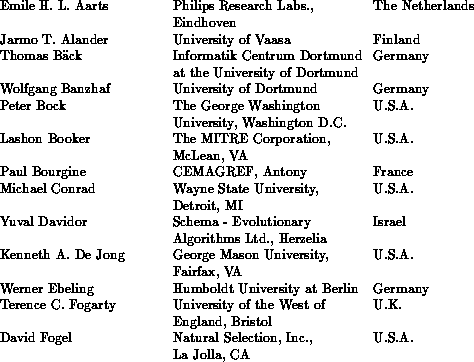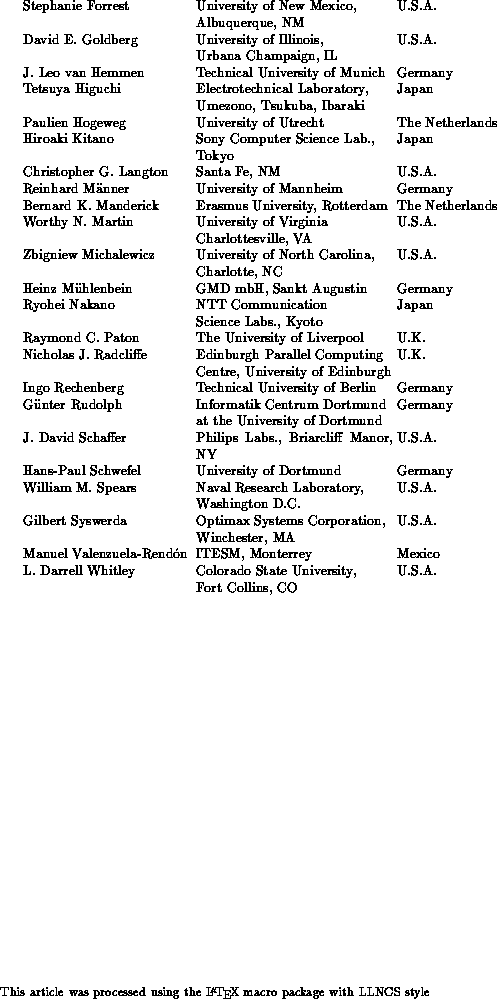Preface
The history of the
conference
In October 1994, the international conference on parallel problem solving
from nature (PPSN) was held for the third time.
The first event of this series took place at Dortmund, Germany, in 1990.
It had originally been planned as a small workshop with about 30
participants. To the big surprise of the organizers, the interest was so
high that PPSN became an international conference with more than 100
participants. The topics covered were, among others, genetic algorithms,
evolution strategies, simulated annealing, neural networks, classifier
systems, immune networks, adaptation processes in general, and other
natural paradigms and their application to solve real-world problems.
Due to the unexpected success of PPSN in 1990 the organizers were
encouraged to plan a follow-up conference, PPSN
, two years later.
Many of the participants from the USA supported this idea although the
biennial international conference on genetic algorithms (ICGA) had already
been established in the USA in 1985. However, ICGA focused primarily on
aspects of genetic algorithms whereas PPSN allowed a broader scope of problem
solving paradigms adopted from natural models. Thus, both conferences
supplement each other, and it was agreed that ICGA and PPSN
should be held alternately, ICGA on odd years in America, PPSN on
even years on the other side of the Atlantic.
Accordingly, the PPSN conference was held in 1992 at Brussels, Belgium.
Compared to the Dortmund conference, the number of participants increased
to about 150. Unfortunately, however, the scope of submitted papers narrowed
down. Most of them dealt with evolutionary algorithms and only a few with
other biological metaphors. Since 1991, the scope of ICGA also changed a
little. Whereas earlier conferences dealt nearly exclusively with ``US type''
genetic algorithms (characterized, for example, by binary encodings of the
decision variables and fixed application rates for the genetic operators),
extensions and modifications to include aspects of the ``European type''
evolution strategies (floating point or integer representation of variables,
dynamic adaptation of parameters, etc.), were adopted. Evolutionary
programming, a contemporary third way of simulating organic evolution with
its own annual conference series at San Diego since 1992, has also been integrated
now within the broader stream of evolutionary computation. A witness of
that fact was the recent first world congress on computational intelligence
(WCCI) at Orlando, Florida, in June/July 1994, where proponents of all three
kinds of evolutionary algorithms met.
To ensure continuity in planning further PPSN conference series and to coordinate them with conferences like ICGA, a PPSN steering committee has been set up. Currently, it consists of the following members:

One of the first decisions the PPSN steering committee took was to
emphasize the diverse evolutionary aspects covered by the PPSN
conference series and to change the conference name into one
more indicative of its scope,
``international conference on evolutionary computation'' with the
running subtitle ``the third international conference on parallel
problem solving from nature'' and the acronym ``ICEC/PPSN ''.
Invited and contributed
talks and posters
Some years ago, theoreticians and practitioners working in the field of
evolutionary computation and other biologically motivated paradigms
could be found in conferences on physics, biology, computer science, economics,
and many others. The PPSN conference series was initiated because there
was a need to bring these people together to facilitate interdisciplinary
cross-fertilization of ideas. At the first PPSN conference in 1990,
this could be achieved in the usual style of a small conference. However,
even the relatively small number of oral presentations and long poster
sessions did not seem to leave enough time for discussions.
For PPSN in 1992, therefore, the style of the conference was changed
radically. It was a nearly poster-only conference, designating only the
invited talks as plenary sessions. The success of this programme structure
led the PPSN steering committee to repeat the same conference structure for
this ICEC/PPSN
event.
The conference scope
To increase the theoretical and empirical understanding of algorithms based
on natural paradigms, ICEC/PPSN brings together an international
community from academia, industry, business, and government.
Examples of such algorithms are genetic algorithms (GA), evolutionary
programming (EP), and evolution strategies (ES) that are inspired by the
organic processes of mutation, recombination, and natural selection in
biology; classifier systems (CS), evolving rule based systems;
cellular automata (CA), evolving according to local ``laws'' like
physical entities; artificial neural networks (NN); and combinations of
the above.
Although PPSN focuses on problem solving using such algorithms, ample room is given to contributions advancing the understanding of basic concepts, their extensions and combination. Additional emphasis is put on practical aspects: How can these computing-intensive algorithms be implemented on parallel computers? How can they be applied to real-world problems? What kind of tools ease their application?
Review of submitted papers
To identify the high-quality contributions, all submissions were reviewed
anonymously by three independent reviewers who are recognized experts in the
relevant fields. Papers whose reviewers disagreed on some important aspect of
the submission were reviewed again by the programme and conference chairs
to resolve the disagreements. Finally, 61 out of 115 papers, which resulted
from this careful filtering process, were selected for inclusion in the
conference proceedings and for presentation at the conference. We are
confident that this process has ensured that ICEC/PPSN presents original,
high-quality contributions to the field of evolutionary computation.
Since this is absolutely vital for the success of the PPSN conference series,
the help of all reviewers on the Programme Committee listed below
is gratefully acknowledged:


It should be noticed that many of the reviewers received considerable help from colleagues. Unfortunately, there is not enough space to mention all of them here. We are very grateful for their important contribution to the quality of the conference and the proceedings. All authors were provided with the reviewers' comments and had the chance to improve their contributions accordingly.
Acknowledgements
Although the work of the reviewers is essential, many more people
are required for organizing a successful conference and for editing
the proceedings. We want to stress that all PPSN conferences have
been and will be non-profit events. Neither the organizers, nor the
reviewers, neither the editors of the proceedings, nor the many helpful
persons involved in the local organization get any benefits from
their work - except the satisfaction of being involved in such an
interesting and important activity.
It is therefore a great pleasure for us to thank all those who
have worked so hard to make ICEC/PPSN a success and to prepare
the proceedings in time. On behalf of all others we want to thank
particularly Thomas Bäck and Frank Kursawe from the University of
Dortmund, Germany.
Jerusalem,Yuval Davidor, Conference Chair
Mannheim,Reinhard Männer, Programme Co-Chair
Dortmund,Hans-Paul Schwefel, Programme Co-Chair
July 1994